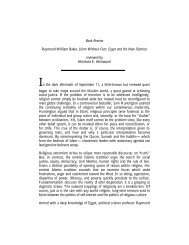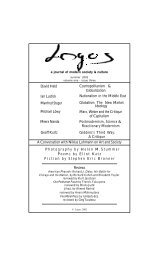Michael J. Thompson Stephen Eric Bronner Wadood Hamad - Logos
Michael J. Thompson Stephen Eric Bronner Wadood Hamad - Logos
Michael J. Thompson Stephen Eric Bronner Wadood Hamad - Logos
Create successful ePaper yourself
Turn your PDF publications into a flip-book with our unique Google optimized e-Paper software.
<strong>Wadood</strong> <strong>Hamad</strong><br />
wish to assist the Iraqis: Thus the strong backlash within a significant portion<br />
of Iraqis, educated or otherwise all across the country, against the manner in<br />
which Arab governments, press, intellectuals and even populace had sought<br />
to represent the situation in Iraq under Saddam Hussein’s rule and now.<br />
Iraqis feel disgusted by the hypocrisy practiced by many an Arab: prior to 9<br />
April, 2003 Iraq’s children were a mere slogan for Arabs as the murderous<br />
sanctions torn them asunder, and as years of political repression sought, but<br />
failed, to create a docile populace. Most Iraqis contend that no progress could<br />
emerge in the Arab world if internal repression persists, and no justification<br />
should be given to any form of authoritarian rule, as the history of modern<br />
Iraq has amply shown: a rich nation, and highly-educated people literally<br />
reduced to selling their belongings to rummage for food for their offspring. 3<br />
Iraq may now present a scenario for the Arabs to follow. No one in Iraq is<br />
oblivious to U.S. reasons for waging war on Iraq, but they recognized their<br />
inability to stand against the U.S. mammoth—since neither Europe nor any<br />
other state dared oppose the U.S.. The split between the dormant left inside<br />
of Iraq and their comrades outside specifically addresses this point. They<br />
both agreed that no positive change could take place in Iraq while Saddam<br />
Hussein’s regime was in power, but they differed on the mechanisms for<br />
change. Those who lived inside Iraq and were experiencing repression on a<br />
daily basis felt that only an outside power could remove the despotic regime.<br />
Then, and only then, could work begin to rebuild the country. Hardly any<br />
Iraqi welcomed the invading forces, and they all agree that the occupying<br />
forces must leave. The collapse of the central government and all its offshoots<br />
created a significant power vacuum as well as a security black hole. At the<br />
current stage, foreign presence is required to maintain peace and order. The<br />
question is how and who should do it? No army in the world is trained to<br />
maintain peace and order among civilians, thus the tragic chaotic scenarios<br />
over the past four months. All visitors to Iraq acknowledge that the young<br />
American GIs are scared witless, and therefore shoot at everything that<br />
moves. This takes us back to questions I posed at the beginning of this<br />
article: Are the U.S. planners incompetent, nonchalant or both?<br />
What is clear is that a strict timeline for a speedy withdrawal of U.S. and<br />
British forces must be put in place, and at the same time a staunch<br />
commitment must be made by the UN for international forces to replace<br />
them at once. There should be no lapse between the two as the political<br />
volatility in Iraq now is serious. Moreover, the Governing Council appointed<br />
<strong>Logos</strong> 2.3 – Summer 2003




